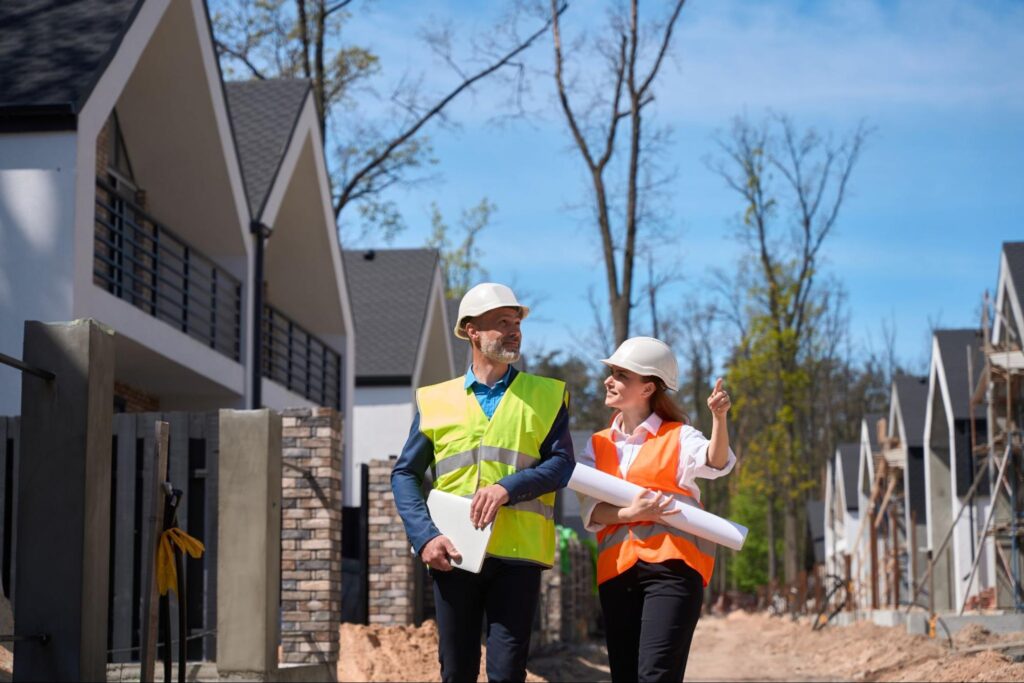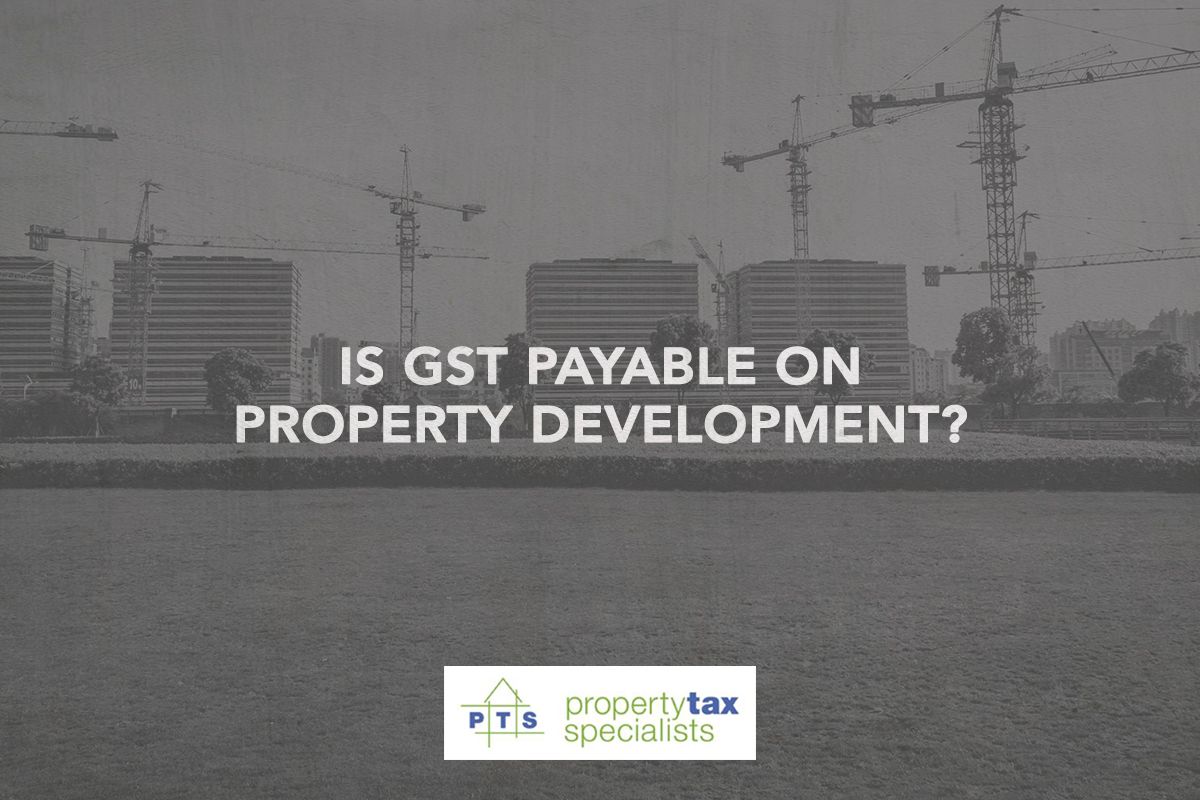Navigating Property Development GST
When it comes to investing in property, the tax environment is relatively straightforward for most investors. You purchase an investment property, rent it out, and pay tax on the rental income you generate. When the time comes to sell the property, you’re required to pay capital gains tax on any profit made from the sale.
This scenario is familiar to many property investors, and while it does involve some complexities, it’s generally well understood.
However, when you venture into the realm of property development, the tax landscape changes dramatically. Suddenly, you’re not just dealing with income tax and capital gains tax; you’re also navigating Goods and Services Tax (GST).
And property development, in this context, doesn’t just refer to large-scale developers constructing multi-story apartment buildings. It also applies to smaller-scale activities such as house flipping or subdividing land.
Essentially, any activity that involves changing the nature of a property or creating new property can fall under the umbrella of property development.
Misunderstanding or misapplying GST can have significant financial implications, so it’s essential to get it right.

Understanding the Landscape of Property Development
Property development is a broad term that encompasses a range of activities. It’s not a one-size-fits-all concept, and the nature of the development work can significantly influence the tax implications, particularly when it comes to GST.
To better understand how GST applies to property development, it’s helpful to first differentiate between the various types of development activities.
Construction
Construction refers to the building of entirely new structures on vacant land. This could range from a single residential dwelling to a multi-story commercial building. In the context of GST, construction is considered a taxable supply, meaning GST is applicable.
As a developer, you’re required to pay GST on the sale of the newly constructed property, but you’re also entitled to claim GST credits for the GST included in the price of goods and services purchased for the construction project.
Renovation
Renovation involves making significant changes to existing structures. This could include activities such as flipping a house, where you purchase a property, make substantial renovations, and then sell the property for a profit.
Like construction, renovation is considered a taxable supply for GST purposes. However, it’s important to note that the extent and nature of the renovations can impact the GST implications. For example, if the renovations are substantial enough to be considered a new residential premise, GST may apply.
Subdivision
Subdivision involves dividing a single piece of land into two or more lots that can be sold separately. The GST implications for subdivision can be complex and depend on several factors, including whether you are registered for GST, whether you are carrying on an enterprise, and the intention of the subdivision.
For example, if you subdivide a block of land and sell the vacant lots, you may be required to pay GST on the sales.

What is Goods and Services Tax?
Goods and Services Tax, commonly known as GST, is a broad-based tax of 10% on most goods, services, and other items sold or consumed in Australia. Introduced in Australia in 2000, GST is an indirect tax, meaning the Australian Tax Office (ATO) levies it on businesses but ultimately the end consumer pays it.
The ATO requires businesses registered for GST to charge GST by including it in the price of taxable goods and services. These businesses can also claim credits for the GST included in the price of their business purchases. This system of charging GST and claiming back credits is often referred to as the ‘GST chain’.
At each stage of the supply chain where value is added—from manufacturers to wholesalers, retailers, and finally consumers—GST is applied. However, businesses in the chain can claim GST credits for their business purchases, ensuring that ‘double taxation’ is avoided.
Determining GST Liability in Property Developments
Once you’ve grasped the basics of GST, the next step is to understand how it applies to your specific property development activities.
GST liability in property development can vary depending on several factors, including the type of property (residential or commercial) and the nature of your development activities.
Residential Property
When it comes to residential property, GST generally applies to the sale of new residential premises. A residential premise is considered ‘new’ if it has not previously been sold as one and has not been previously rented out for a continuous period of five years since it was constructed.
If you’re a property developer undertaking a construction or substantial renovation project, you’re required to pay GST on the sale of the new residential premises. However, you’re also entitled to claim GST credits for the GST included in the price of goods and services purchased for the project.
You should note that the sale of existing residential premises is generally exempt from GST. This means if you’re selling a residential property that has been previously sold or rented out, you’re not required to charge GST on the sale.
Commercial Property
Commercial property, on the other hand, generally attracts GST regardless of whether it’s new or existing. If you’re selling commercial property and you’re registered or required to be registered for GST, you’re required to charge GST on the sale. This includes commercial residential premises such as hotels, motels, and caravan parks.
However, similar to residential property, you’re also entitled to claim GST credits for the GST included in the price of goods and services purchased for your commercial property development project.
Are There Any GST Exemptions?
While GST is a common aspect of property development, there are certain circumstances where exemptions may apply.
Existing Residential Property Sales
As we mentioned previously, the sale of existing residential properties is generally exempt from GST. This means if you’re selling a property that has been previously sold or rented out, you’re not required to charge GST on the sale. However, this exemption does not typically apply to property developers who are selling newly developed properties.
Margin Scheme
The Margin Scheme is a method of calculating GST that can potentially reduce your liability. Under this scheme, GST is calculated on the profit margin of the sale rather than the total sale price.
For example, if you bought a property for $1,000,000, developed it, and then sold it for $2,100,000, your profit margin would be $1,100,000. Under the Margin Scheme, you would pay GST on this margin, which would be $100,000 (1/11th of $1,100,000). Without the Margin Scheme, you would pay GST on the total sale price, which would be $190,909.09 (1/11th of $2,100,000).
To use the Margin Scheme, both you and the buyer must agree to its application and note it on the contract.
Sale of a Going Concern
The sale of a going concern refers to the sale of a commercial property that is currently leased to an existing tenant. If the property is sold as a going concern, the sale is generally GST-free. However, this means you are limited in your ability to claim GST credits.
For example, if you developed a block of ten industrial units, leased them out for several years, and then sold them with the leases, this would be considered a sale of a going concern. The sale price would not include GST’s.
To qualify for this exemption, both you and the buyer must be registered for GST, and both must agree to the arrangement and note it on the contract.
Key Takeaways
Whether you’re a large-scale developer constructing multi-story apartment buildings or a small-scale investor flipping houses or subdividing land, GST is a factor you cannot afford to ignore.
The key takeaway is clear: understanding your GST obligations and entitlements is not just beneficial; it’s essential.
And while this guide provides a comprehensive overview, it’s always advisable to seek professional advice tailored to your specific circumstances.
At Property Tax Specialists, our team of experts can provide the advice and guidance you need to ensure you’re meeting your GST obligations and maximising your GST credits.
Reach out to us today.
Disclaimer
Please note that every effort has been made to ensure that the information provided in this guide is accurate. You should note, however, that the information is intended as a guide only, providing an overview of general information available to property buyers and investors. This guide is not intended to be an exhaustive source of information and should not be seen to constitute legal, tax or investment advice. You should, where necessary, seek your own advice for any legal, tax or investment issues raised in your affairs.



